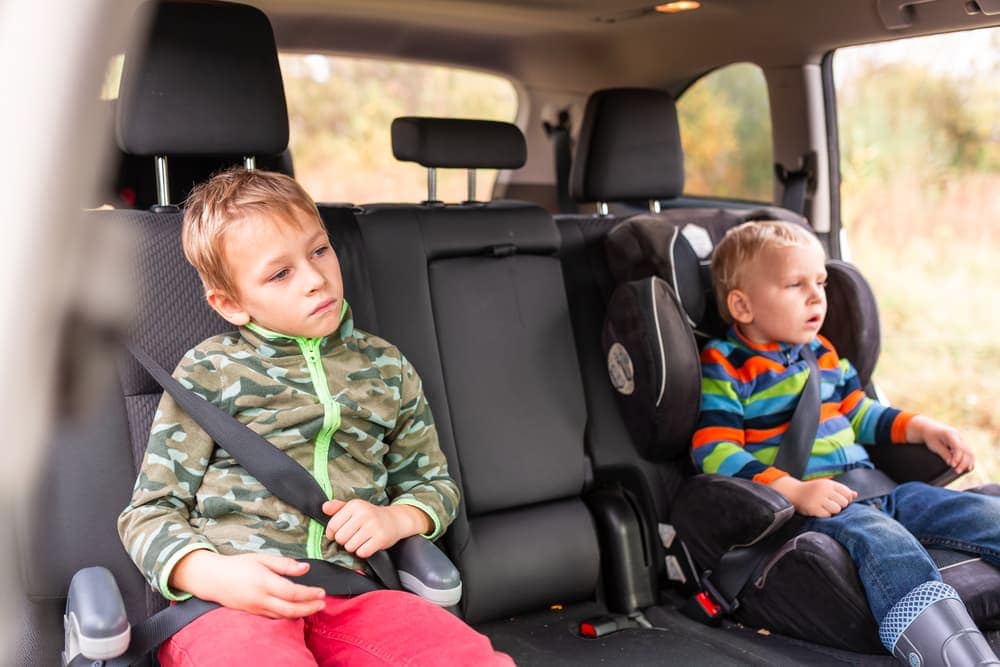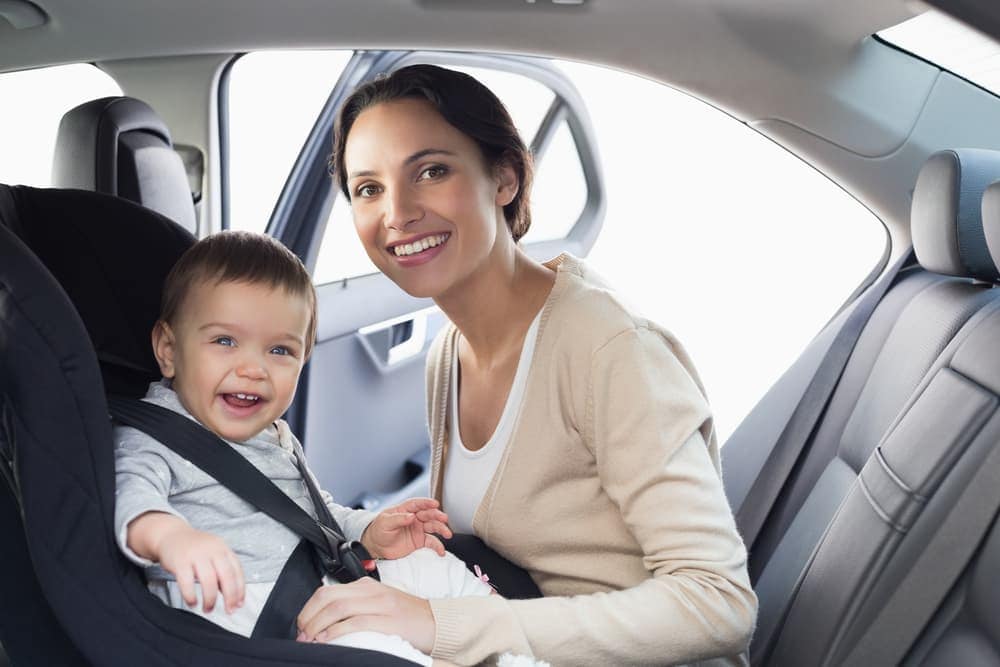Car crashes are very common in the United States. In fact, this accident is the leading cause of death for people between the ages of 1 to 54 in the US.
Particularly in Pennsylvania, approximately 115,900 car crashes were reported in 2022, as reported in the Pennsylvania Crash Facts and Statistics. In the same year, at least 1,179 people died due to car accidents.
Among these cases of car accidents, several lives of children have been claimed. To reduce the numbers, the state of Pennsylvania strictly observes car seat laws.
This article reviews the critical details of the Pennsylvania car seat laws and new amendments.
Key Takeaways:
2. Children under the age of 2 must be seated in a rear-facing car seat with restraints, whereas children aged 4 to 13 must be in a front-facing booster seat with a safety harness.
3. Badell’s Collision can help you identify the best car seats and provide automobile services to ensure compliance with the law.
What Are the Pennsylvania Car Seat Laws?
Since 1984, Pennsylvania has had a law that requires all children under the age of 4 to be secured in a safety seat. Over the years, this law has been updated to protect the lives of child passengers further.
The law initially only required children to be fastened by a seatbelt. Around 1993, the law was updated, requiring children under 4 to be in a child safety seat. Approximately 10 years after this update, the law was amended to add the booster seat requirement for children between 4 and 7.
The Car Seat Law is one of the three major restraints included in the Pennsylvania car safety law.
The law specifically states that all children under 4 must be secured in a child restraint system when inside a vehicle. In addition, children under 2 must be in a rear-facing car seat. The child may be exempt from this latter requirement if they exceed the weight and height limits.
A part of the law requires car seats, including booster seats, to be properly installed to ensure effectiveness. The Centers for Disease Control and Prevention noted that 46% of car and booster seats are improperly used, putting the lives of children at stake.
What Are the Pennsylvania Car Seat Rules and Booster Seat Requirements?
The Pennsylvania car seat rules and booster seat requirements have been updated since 2016. The most recent amendment to the law is the addition of the direction in which the car seat faces. This change was made to match the National Highway Traffic Safety Administration guidelines.
Below are the specific car seat rules and booster seat requirements of Pennsylvania:
- Children under 2 years old
- Children riding the vehicle must be secured in a rear-facing car seat until they reach the maximum weight or height limits designated by the car seat’s manufacturer.
- Children from 2 to 4 years old
- Children must be seated in a child safety seat with proper restraints.
- Children between 4 and 7 years old
- Children should be kept in a forward-facing booster seat with a harness until they reach the car manufacturer’s height and weight limits.
- Children between 8 to 12
- Children must be seated in a booster seat with a harness until they are big enough to use adult seat belts properly. The condition must be that the lap and shoulder belt should properly fit the upper thighs, shoulder, and chest, respectively.
In addition to these provisions, the law requires children to sit in the rear whenever possible and be properly buckled.
In following these rules, it is critically important to consider the car seat manufacturer’s instructions and limits. This will help you determine the safest position for children onboard.
Always check the specific details and any updates to the law, as regulations can change. You can refer to the Pennsylvania Department of Transportation (PennDOT) or other official state resources for the most current information on booster seat requirements in Pennsylvania.
What Is the Reason Behind the Car Seat Law or PA Booster Seat Law?
Despite the significantly lower cases of car crashes in Pennsylvania since its highest record, the numbers are still high. According to the Pennsylvania Department of Transportation, approximately 13 crashes per hour occur in Pennsylvania. Among these cases, one fatality is recorded every 7 hours.
Pennsylvania is known as one of the top states for deer collisions with vehicles.
The car seat and PA booster seat laws are part of ensuring driving in Pennsylvania is safe. The PA car seat laws amendment aims to strengthen and protect children further during transportation.
Traffic accidents can result in serious injuries, especially for young children whose bodies are still developing. Properly installed and appropriately used car seats and booster seats provide protection that significantly reduces the risk of injury or death in a crash.
Research shows that properly installed and used child safety seats reduce the fatality of injuries by 71% for infants and 54% for toddlers.
What Are the Consequences of Not Having a Child in a Car Seat in PA?
In Pennsylvania, as in many other states, there are legal consequences for not properly restraining a child in a car or booster seat. If drivers fail to comply with the state’s child passenger safety laws, they may face penalties and fines.
According to Pennsylvania’s Childe Passenger Protection Laws, violators are subject to fines and stopped as a primary offense. The citation may vary depending on the age of the child passenger, but the fines are almost the same for all.
A violator’s fee of $75.00 plus Court Costs will be collected. In addition, a $45 surcharge, $10 EMS fund, and $10 administrative costs must be paid.
The fine can be dismissed if the violator can provide proof of acquisition of a child passenger restraint system before the hearing.
Parents and caregivers must understand and comply with the child passenger safety laws in their state, including Pennsylvania. Ensuring that children are properly restrained by these laws not only avoids legal consequences but, more importantly, helps protect the safety and well-being of the child in the event of a car accident.
When Did Car Seats Become Mandatory in PA?
Pennsylvania car seat laws have required all children aged 4 and under to be secured using a child safety restraint since 1993. The PA law was then revised in 2003 to include a booster seat requirement for children aged 4 to 8 or when they outgrow the height and weight limits.
In 2016, the presiding Pennsylvania governor updated the law to require all children aged 2 and under to be seated in a rear-facing child car seat. This seat is also advised to be in the vehicle’s back seat.
When Can a Child Stop Using a Car Seat in Pennsylvania?
By law, children over the age of 8 and under 13 do not need a car seat. Although, they are still mandated to sit at the back of the vehicle with a seat belt across their body.
As for the weight and height limits for children under the age 8, the limits are 57 inches tall and 80 pounds. That means children over these limits can abstain from using a car seat. These children are then permitted to use the lap and shoulder belts once they fit correctly.

How do you choose the right car seat according to the PA Booster Seat Law?
The Pennsylvania child passenger safety law bases its recommendations on the National Highway Traffic Safety Administration (NHTSA) guidelines. The guidelines clearly advise being meticulous in selecting a car seat for your children.
Follow these guidelines to keep your children safe:
- Choose a car seat based on your children’s age and size. Consider the model and size of your vehicle as well.
- Always read and refer to the car seat manufacturer’s advice and instructions regarding height and weight limits.
- Keep your children in a car seat as long as they fit properly.
- Always keep your children in the back seat until they are 13 or fit the height and weight limits allowed.
Before purchasing a car seat, it is best to understand the best type of car seat for your vehicle and children.
You can also use NHTSA’s car seat finder to compare and find the appropriate car seats for your family.
Ensure Compliance With Car Safety Laws With the Help of Badell
Badell’s Collision can help you ensure compliance with Pennsylvania car safety laws. We can help you choose the perfect car seats, booster seats, seat belts, and other safety equipment to protect your family.
You can get expert information and advice from our team of professionals. Our services range from auto body repairs to helping you with insurance claims in case of collisions. Allow our team members to help you find the best solution for your automobile problems.
Learn more about our services or ask for an online estimate now.
Frequently Asked Questions
Can You Put a Car Seat in a Single Cab Truck in Pennsylvania?
Yes, you can. The United States Department of Transportation legally allows you to put a car seat in front of a single cab truck. This is allowed, provided the width of the truck’s backseat can support 85% of the child safety seat.
When Should I Switch to a Booster Seat?
Based on Pennsylvania law, you are legally allowed to use a booster seat once your child reaches 4 years of age until 8.
Are Front-Facing Car Seats Legal in PA?
As of 2016, all child seats must be rear-facing if you have a child aged 2 or under. You can only use a front-facing or forward-facing seat once your child outgrows the rear-facing car seat or the set limits.
Can a 12-Year-Old Sit in the Front Seat in Pennsylvania?
No, they cannot. A child aged 12 and under is legally not allowed to sit in the front seat of a vehicle in Pennsylvania.
Can a 10-Year-Old Sit in the Front Seat in Pennsylvania?
No, they cannot. A child is only allowed to sit in the front seat of a vehicle if they are 13 years old, as per the recommendations of the Pennsylvania Department of Transportation.



